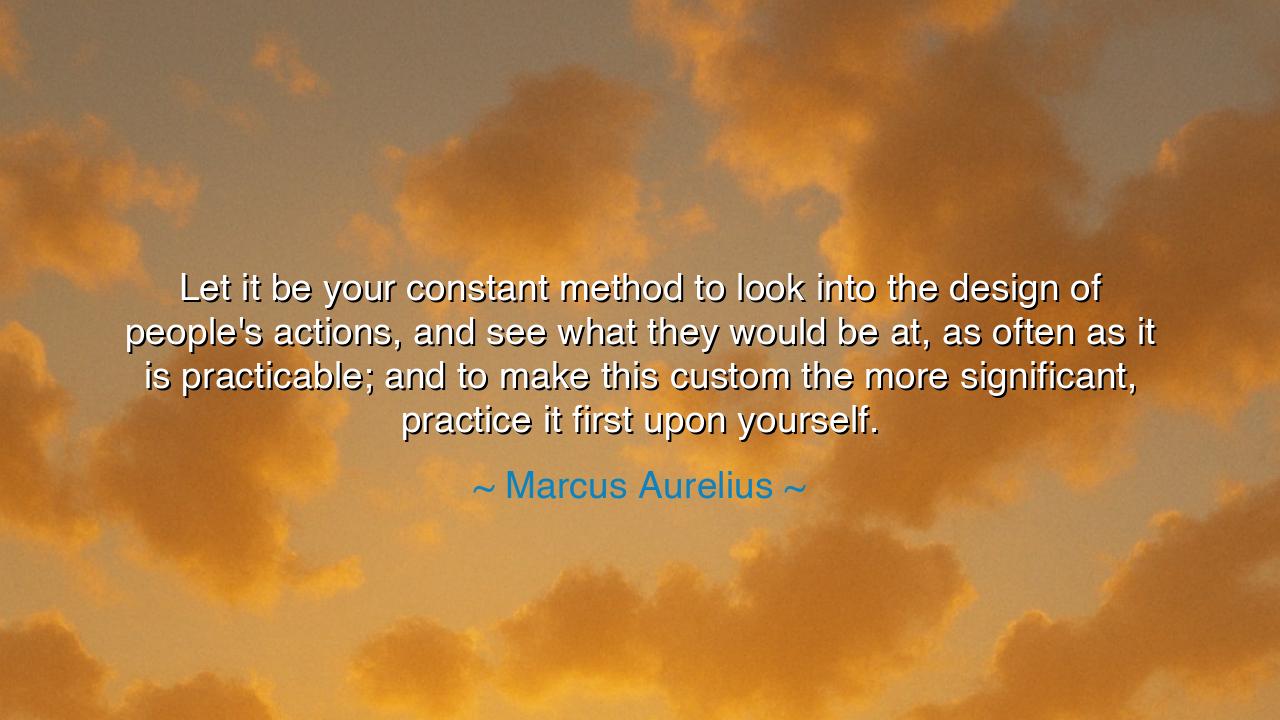
Let it be your constant method to look into the design of
Let it be your constant method to look into the design of people's actions, and see what they would be at, as often as it is practicable; and to make this custom the more significant, practice it first upon yourself.






When Marcus Aurelius, philosopher and emperor, wrote, “Let it be your constant method to look into the design of people’s actions, and see what they would be at, as often as it is practicable; and to make this custom the more significant, practice it first upon yourself,” he was giving counsel not only for rulers, but for all who would live wisely among humankind. In these words, drawn from his immortal work Meditations, he unveils the secret art of understanding motive — the discipline of seeing beneath appearances to the hidden purposes that guide behavior. For Marcus, life was not to be navigated by impulse or opinion, but by reason and clarity, born of deep reflection upon the inner workings of the soul.
The origin of this teaching lies in the Stoic tradition, that ancient philosophy of resilience and virtue which sought harmony between the self and the order of the universe. Marcus, though seated upon the throne of Rome, found his true dominion within — in the mastery of his own thoughts and passions. Surrounded by courtiers, flatterers, and conspirators, he learned that the actions of men are like the shifting winds: they may seem chaotic, but each is driven by a current of intention. To rule wisely, one must learn to see not only what people do, but why they do it. Yet, in his humility, Marcus warns that this practice must begin with oneself. Before one presumes to judge the motives of others, one must first examine the design of one’s own heart.
For how often, O seeker, do we misread the world because we have not first read ourselves? A man blinded by pride will see pride in every other; one consumed by envy will imagine envy in his neighbor. Thus Marcus urges self-scrutiny before judgment. The true philosopher, and indeed the just ruler, must be both observer and observed — ever watchful of the hidden causes that stir within. When one learns to discern one’s own motives — to separate the pure from the vain, the noble from the self-serving — then and only then can one perceive the intentions of others with fairness and compassion.
In the courts of Rome, Marcus would have seen many whose words spoke loyalty while their hearts plotted gain. Yet rather than respond with bitterness, he sought to understand their design — their fears, their desires, their weaknesses. To see the motive is to see the man; and to see the man is to govern him justly. This insight echoes even in the smallest dealings of daily life. When insulted, the wise man asks not “What was said to me?” but “What moved this person to speak so?” Was it ignorance? Was it pain? Was it a moment of folly? Such reflection transforms anger into understanding and judgment into mercy.
History offers countless examples of those who mastered this discipline of perception. Consider Abraham Lincoln, who, like Marcus, led his people through turmoil and division. He was known not for vengeance, but for his uncanny empathy — his ability to see into the motives of both friend and foe. When urged to punish his critics, he replied, “Do I not destroy my enemies when I make them my friends?” Like Marcus, Lincoln understood that to comprehend motive is to disarm hostility. His greatness lay not in power alone, but in understanding — in the ability to see humanity even in those who opposed him.
Yet Marcus’s teaching is not easy. To look into the design of actions requires patience, humility, and courage — for in seeking the motives of others, one often encounters reflections of one’s own. It demands that we quiet the noise of judgment and listen for the still voice of truth. It calls us to live as philosophers in the truest sense: not in lofty thought alone, but in the steady practice of self-awareness and compassion. The more one understands motive, the less one is swayed by anger, envy, or deceit. For the wise see through the surface of things and rest undisturbed in the knowledge of how the world moves.
So, O student of the inner life, take this lesson to heart: before you seek to know the hearts of others, turn your gaze inward. Ask yourself daily, “Why do I act as I do? What drives my choices, my words, my silences?” Practice this until your mind becomes clear as a mirror — until you can look upon the deeds of others without arrogance or resentment. Then you will see, as Marcus saw, that every man acts according to what he believes good, even when he errs.
And in this understanding lies peace. For when you grasp the design behind human action, compassion replaces contempt, and wisdom replaces wrath. Practice this, as Marcus Aurelius counseled — not occasionally, but constantly, as a way of life. In knowing yourself, you will know mankind; and in knowing mankind, you will walk through the world not as a judge, but as a guide, calm amid the chaos of men, as serene as the stars that look down upon Rome eternal.






AAdministratorAdministrator
Welcome, honored guests. Please leave a comment, we will respond soon